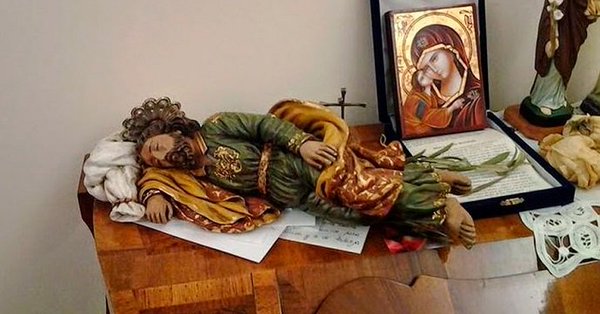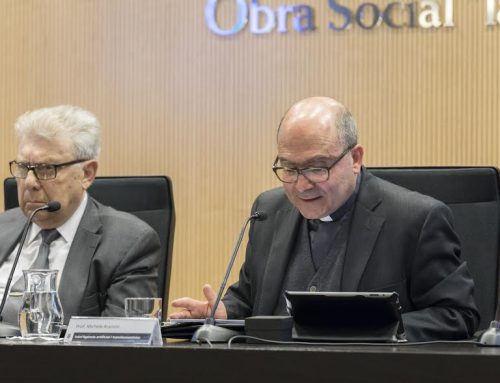by Father Patrignani, S.J.
St. Joseph is the Special Patron
of the Agonizing, and of a Happy Death

There are so many wonderful motives which impel us to a tender devotion to the glorious Patriarch St. Joseph, but perhaps the motive which we are now about to consider is the most powerful of all. As the sentence of death has been pronounced on all, without exception, it follows that each and every soul, without exception, should endeavor to secure the interest and friendship of him who is all-powerful in procuring everyassistance for his clients at that awful and decisive hour, to enable them to die happily. If a person engage in a lawsuit, on the outcome of which depends an immense gain or utter ruin, does he not call in the aid of some eminent advocate, one on whose zeal for his interest he may safely depend? Now every Christian, at the moment of death, is about to hear an irrevocable sentence pronounced upon him, upon which will depend his eternal life, or eternal death. The rage and temptations of the Devil at that critical moment combine in disputing, as it were, his claim to the Kingdom of Heaven. There is the remembrance of past sins, fear of what lies ahead, and the terrible uncertainty as to the real spiritual condition of one’s soul at that awful moment. The dying soul is thus tortured with the dreadful apprehension of being condemned to the eternal loss of God; that God Who loved him so much as to die for him, Who alone can make him happy. His damnation would plunge him into that Hell of fire “where the worm dieth not”, and the fire is never extinguished. Why not at that critical moment call on some saint to plead his cause, and to obtain a favorable sentence for him at that awful Tribunal, whence there is no appeal, should he have the misfortune to be condemned? Who is there better qualified to perform this charitable office than good St. Joseph? He is acknowledged by all Christendom to be the special advocate of dying Christians, and for this reason his aid is zealously sought, many altars have been raised in his name, and the feast of his blessed death has been devoutly celebrated throughout the centuries.
Among the many motives for which St. Joseph has been designated the particular patron of dying persons, even in preference to other saints, there are three which more especially urge us to consider him as such:
- St. Joseph is the adopted Father of our Judge, whereas the other saints are but His friends;
- His power over the legions of Hell is more formidable than other saints;
- His death was the most singularly privileged, and the happiest ever recorded in the annals of mankind.
St. Joseph is the Father of our Sovereign Judge
In the first place, St. Joseph is the father of Him Who is to pronounce our eternal doom. His position with God is uniquely without parallel in the history of the world. We can judge his power of intercession by considering what great power the Patriarch Moses had with God. He was but the leader of the Jewish people. Nevertheless, so great does his authority seem to have been, even where God Himself is in question, that when he asks Him to grant favors to that ungrateful and almost incorrigible race, his prayer seems to become a command, which paralyzes, as it were, the hands of the Divine Majesty, and deprives them of the power of chastising the people, until Moses gives them liberty (Exodus, 13). But how immeasurably greater is thy power with the Sovereign Judge, O great Patriarch! Thou, whose sublime vocation it was to be a Guide, Guardian, and Father to Him Who will one day judge both the living and the dead.
Let us now, for a moment, suppose that a devout client of our saint has received his last awful summons, and is warned to prepare for death. His holy Patron immediately presents himself before the tribunal of Jesus Christ, to Whom he addresses this prayer: “Ah! do not refuse, for my sake, to take compassion on this poor creature, and strengthen him now with Thy all-powerful grace; enable him to make an act of the most perfect contrition, and to die in Thy holy love. I implore Thee to grant me this favor, O Sovereign Judge! By the sweet name of ‘Father’, with which Thou hast so often honored me; by the joy and rapture with which I received Thee as an infant into my arms in the stable at Bethlehem, when I sheltered Thee in my bosom from the piercing cold. Remember that it was these arms that transported Thee into Egypt beyond the reach of Herod’s fury. I implore this favor by those Divine Eyes, whose Tears I so often wiped away; by that Blood which I received as a priceless treasure at Thy Circumcision; by the labors and fatigues to which I devoted my life, in order to provide sustenance for you.” With Jesus Christ such an appeal must be irresistible: the many affecting instances here brought forward by St. Joseph of his tender love for his Divine Redeemer, must serve as so many chains to bind the Hands of Jesus, Who will be constrained to say, as formerly to Moses: “Suffer me at least, Father, to do justice to the sinner.” But St. Joseph will not yield; he implores the Divine Judge to mercifully pardon the repentant criminal. But in truth, St. Joseph has no need to enforce his authority, for, as Gerson says, his prayer has all the force of a command. How great a happiness, then, is it not for a dying person to possess so eloquent an Advocate in the Father of his Judge, one who can so powerfully plead his cause-a cause, on the issue of which an eternity of happiness or misery depends!
St. Joseph is the Terror of Hell
It is, moreover, a great advantage to a dying person, to have as a Patron a Saint whose very name is terrible to the damned. Amongst many other honorable titles bestowed on him by the Church, may be found that of “Terror of Demons.” He merited this glorious title when, in order to save the Divine Infant from the murderous plots of Herod, he transported Him into Egypt. Herod was a both a figure of the infernal monster, and his vile instrument, through which he sought to destroy the tiny Redeemer. In defeating Herod’s wicked designs, St. Joseph conquered the devil also, that arch-persecutor of Jesus and of all the souls who were purchased by His most Precious Blood; and this first victory enabled him to gain another far more glorious.
Origen remarks that the order given by the angel to St. Joseph to “go into Egypt”, comprised also the power to drive away all the devils who had fixed the center of their empire in that infidel land. Scripture informs us, that as soon as the holy Patriarch entered Egypt with the Child Jesus and His Immaculate Mother, the idols were overturned, the oracles destroyed themselves, the Father of Lies was chained down, and the infernal spirits of darkness took flight at the appearance of the “Sun of Justice,” though then hardly risen, and enveloped in the mourning garb of humanity. The prophet Isaiah (chap. 19) had foretold all of these prodigies. The glory of these victories, doubtless, belongs to the Infant God; but He was pleased to achieve them by the arm of St. Joseph, as being the head of His family, the Guide and Savior of the “Savior of the World.”
Seeing himself once overcome, the devil thence began to tremble at the name of Joseph; but has he not greater reason at present to fear him, when he sees the brilliant lustre with which his merits, his sanctity, his dignity, and his power shine forth? St. Joseph is one of the first dignitaries of Heaven; he there occupies the rank, which is due to the King’s Father and the Queen’s Spouse. Lucifer is aware of this, and hence it is that with fear and trembling he approaches the bed of a dying person who, during life, had been a true servant of St. Joseph. He knows that our Divine Savior, in order to reward this great saint for having saved Him from the sword of Herod and a temporal death, has given the special privilege of preserving those dying persons who, during life, looked up to him as their protector, from the power of the devil and eternal death. Is it likely that St. Joseph will fail to make use of so great a privilege? Ah! Surely not; and history abounds with accounts which testify to what a sincere friend and benefactor he has been to his clients. It is the experience of so many signal marks of his protection, that has induced countless generations of Christians to have recourse to him, certain to find beneath his wings their best security against the wiles of Satan at that tremendous crisis, when his fury is raised to its highest pitch, at the aspect of his prey about to escape from him forever.
St. Joseph’s Happy Death is the Wonder of the Ages
A Christian not only requires a powerful protector, who will shield and fortify him against the danger of that last and violent combat; he also looks for a friend, whose love will suggest to him a thousand ways of administering comfort, and of alleviating, in some measure, the grievous anguish of that last hour. Who is more qualified to undertake so necessary, so consoling a ministry, than he who received himself such powerful assistance, such exquisite consolation, at that bitter hour? For thee alone, O Joseph! was reserved the happiness of beholding Jesus and Mary bending over thy bed of death.
These two noble Hearts strove to leave nothing undone within the limits of their humble state, to repay all the services rendered to Them by thee during so many years, with so much zeal and affection. During thy last illness, They both served thee with Their own hands, and in a manner worthy of the charity of God Made Man, and His Blessed Mother; for those comforts which Their poverty could not procure, They endeavored to compensate by redoubled tenderness and solicitude, which was a subject of admiration to the whole Court of Heaven.
It is said that, on the day previous to St. Joseph’s death, bands of the angelic choirs descended from Heaven, to console and cheer him with their sweet concerts. And if God has deigned to grant consolations of a similar nature to many of His servants, as we learn from authentic statements, how could He refuse them to the greatest of all His saints, to the Guardian and the adopted Father of the Incarnate Word? We are told that at the death of the Venerable Isabella, a Carmelite nun, four consoling angels stood at each corner of her bed, singing on their harps these words from Isaiah (chap. 3): “Say to the just man that it is well.” But to whom can these words of consolation better be applied than to St. Joseph? Does not the Holy Ghost Himself bestow on him the epithet of the just man? The angels may therefore, with justice, have thus addressed him: “Hasten thee to a better world, O happy Joseph! Thy death is truly that of the just, because of thee alone can it be said, that thou didst breathe forth thy spirit in the embraces of Him Who is Justice and Sanctity Itself, of Him Who is the Source and Giver of life! Go, then, noble Lord of the Patriarchs, go, and bear to them the good tidings of their approaching Redemption. Behold, we are now about to form a crown of lilies for the Virgin spouse, a crown of roses for the first persecuted member of Christ’s infant Church, and a crown of brilliant stars for the adopted Father of the Redeemer, for him who is so much our superior in all virtue and prerogatives; we go to prepare for him a throne near that which shall be occupied by his Blessed Spouse, the Virgin Mother! Thrice happy Joseph! Greater in Heaven than was the Patriarch Joseph of old at Pharaoh’s court, thou will there be the first officer in the Court of the Most High, the dispenser of His treasures, the Protector of the Church, and the Advocate and Patron of all Christians.”
But if the angelic concert proved such a source of joy and comfort to St. Joseph in his last moments, who shall be able to conceive the sweet transports of his soul when the Divine words of Jesus fell upon his ear? St. Bernardine of Sienna, contemplating St. Joseph’s happy death, attended as it was by all that was great in Heaven, cannot find language to describe the consolations, the supernatural illuminations, the languors, and ecstasies of love with which this blessed soul was favored. In return for all the affectionate caresses, which Jesus received in His childhood from this holy and tender father, He now lavishes upon him a thousand testimonies of affection and sympathy in his suffering state, with all the devoted tenderness of filial love in the trials of death. For his past labors, Jesus infuses into the soul of His adopted parent torrents of interior joy; for all the tears shed on His account, He repays him by so many heavenly consolations; for all the anguish and solicitude he endured, He gives him so many secure pledges of confidence and peace. While with one hand He supports his drooping head, He places the other on that bosom which had been the resting-place of His Sacred Infancy, and pierces it with the darts of His Divine Love.
The Immaculate Virgin Mary then humbly returns thanks to her cherished Spouse for his holy companionship, his indefatigable care and tenderness in her regard; and her words acted on the dying saint as so many darts of love which terminated his existence: whence some have said that St. Joseph’s death was caused only by the violence and ardor of his love! However the case may be, the Church at one time compares his death to a peaceful slumber, such as a child enjoys on its mother’s bosom; at another time, to an aromatic candle, which is gradually being consumed while it burns, and diffuses all around an odor of exquisite sweetness. The death of all the saints is a subject of holy envy, because they all die in the embraces of Our Lord; but this can be said of them only in a spiritual manner, and signifies the close union of love which binds them to Our Lord. But St. Joseph actually expired in the embraces of Our Lord, for he breathed his last in the Arms of Jesus, and in the act of receiving His last blessing and embrace. If, as seems probable, he retained the use of his speech and of his senses to the last, could he have more worthily terminated so holy a life than by repeating often the sweet names of Jesus and Mary? O thrice blessed death! If I cannot have the happiness of breathing forth my soul in the arms of Jesus and Mary, may I at least with my dying lips join thy name, O great and privileged Joseph! to those of Jesus and Mary!
The bonds of affection, which united this Blessed Mother and her Divine Son to holy Joseph, were not severed by his death. Both in anguish closed his eyes, and both paid him the tribute of their tears; for let not any one deem it unworthy of Jesus that He should weep on such an occasion. Surely His affection for Joseph was much more tender and lively than that which He afterwards felt for His friend Lazarus! His groans and tears at the tomb of Lazarus astonished the spectators, and elicited from them the remark: “Behold, how He loved him!” Is it not very reasonable to suppose that such great sorrow was far more justly due to him who was not only a friend, but also His Guardian and His adopted Father? So that those persons who visited the mortal remains of St. Joseph, might also have said of Jesus: “Behold, how He loved him” (John 11). Thus reasons John Eckius, a pious contemplative.
Gerson adds, that Jesus Himself washed this virginal body, that He crossed the hands over the breast, that He afterwards blessed it, in order to preserve it from the corruption of the tomb, and charged the angels to guard it until it should have been laid in Joseph’s ancestral sepulchre, between the Mount of Sion and that of Olives. The general opinion is, that he died about the age of sixty, and before our Divine Lord left Nazareth in order to receive Baptism from St. John the Baptist.
From all this it may be inferred how just and reasonable it is that all Christians should choose St. Joseph as their patron at the critical and inevitable moment of death. Father of their Judge, whose anger his authority will soften and pacify-Conqueror of devils, his presence will chase them away from the bed of death-favored himself by the most happy and tranquil death ever known, will he not come with his holy Spouse to assist those Christians at the hour of death who shall have invoked and professed themselves his devoted servants during life? Therefore, as we must all die, we should all hasten, while there is yet time, to secure St. Joseph’s protection as our Patron at the hour of our death. The Church exhorts us to do so in the hymn in which She celebrates his happy passage to a better world. As a docile child of this Holy Mother, let us joyfully conform to Her wishes. In anticipation of that dread hour, let us not fail to often call upon our august Protector in the full vigor of our lives.
Prayer to St. Joseph for a Happy and Holy Death
O Blessed St. Joseph! It is not without reason that thou hast been preferred to so many other saints, and honored as the special patron of dying persons, of those who are desirous of securing for themselves the greatest of all graces, that of a happy death. Thy death was so consoling, so precious, that it is a subject of envy to all the just on earth. Thou hadst Jesus and Mary at thy side, both anxious to make thee some return for all the services thou didst render to them during thy life; both administered to thee in turn all the little comforts which their extreme poverty would allow them to procure; Jesus comforted thee by the words of eternal life; Mary consoled thee by bestowing on thee a degree of care and attention which the utmost tenderness alone could suggest. How often did the arms of Jesus support thy languishing head! How often did Mary wipe the perspiration of death from thy countenance! Ah! How couldst thou not have died of love when thou beheld Jesus and Mary-a God, and the Mother of a God-supporting and consoling thee in thine agony? The holy old man Simeon died in peace and full of joy, for having beheld Jesus for a few moments; and thou, O Blessed Joseph! who for so many years had Him constantly before thine eyes, who a thousand times bestowed upon Him the caresses of a good Father, and received from Him those of a fond Son; thou whom He considered a duty to obey to the last moment of thy life; thou who were to breathe out thy last sigh whilst receiving a last embrace from Jesus; thou, in a word, who knew that Mary herself was to close thine eyes. Oh! with what far greater justice mayest thou not sing with Simeon, before thou dost expire, that canticle of love and joy: ‘Now, O my Jesus, my Son, and my God! Now Thou dost dismiss Thy servant, Thy father, Thy guardian, in peace!’
Most holy and blessed Patriarch, since thy death has been so sweet, so honorable, so precious in the sight of the Most High, I now at this moment earnestly implore thy protection for my last hour; obtain for me, I implore thee, at that moment so terrible for the sinner, the grace to detest most sincerely all the sins of my life; to hope with unshaken confidence in the infinite Mercy of my Redeemer and my God, Who for my salvation commenced His Life in the Crib, and consummated it upon a Cross! And finally, may I cherish also the most unbounded confidence in my loving Mother Mary, and in thee, my dearest Father. I now repeat with all the ardor of my soul that which I wish to say when in the act of expiring, “Jesus, Mary, and Joseph, I implore Thee to assist me in my last agony!” Amen.
- The Rev. Father Patrignani, S.J., was an Italian Jesuit priest and author of the nineteenth century. His Manual of Practical Devotion to St. Josephserves as an instruction to the faithful on how to truly devote oneself to this remarkable humble and just saint. Father Patrignani’s work was originally published in 1865 by James Duffy, Ireland, and again in 1979 by Marian Publications. It was also printed by TAN in 2010.










